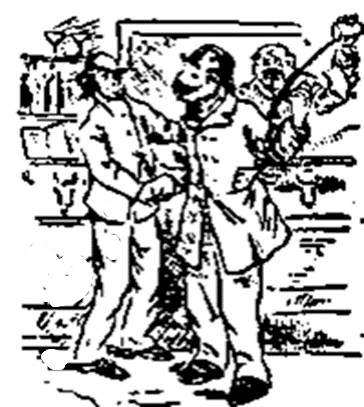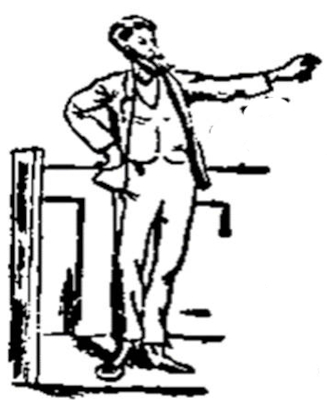This article has been transcribed from a copy of the Cardiff Times in the online collection of scanned Welsh newspapers 1804-1919 in the National Library of Wales, with grateful recognition of the free access accorded to all readers. Paragraph breaks have been introduced for easier reading.
Samuel wishes to discredit strikes and strikers by ridicule, but his argument is lost in his pursuit of bad puns. He cannot take a coherent position on the subject, having announced at the outset (see caption to the first image) that he judges strikes on the basis of the physical attractions of the strikers. He will not credit strikers with rational thought, maintaining that they are led astray by the ‘paid agitators’, and enjoy the opportunity strikes give to visit pubs. (How strikers are to find the money to drink he does not explain. For completeness, he includes an irrelevant anti-Irish slur in 'Ould Oureland', a derogatory name for Ireland. He favours attractive young women, and in his conclusion even manages to combine antisemitism with his sexism.
There was an increase in trade-union membership around this time, from 817,000 in 1888 to 1.470,000 in 1890, and that the number of strikes rose from 517 in 1888 to 1,211 in 1889. It was believed, and still is in some circles, that such shifts in workers’ behaviour could be dismissed as irrational and a form of infection or epidemic.('Striking seems to be contagious, like the measles or yawning,' says Samuel.) Fears that strikers aimed to achieve radical change in the entire organisation of society, following the model of the Paris Commune of 1871, were, however, unfounded, and strikes were directed at improving working conditions and pay. Deep faults in British industry were beginning to be felt, as German and the USA overtook Britain in technology and mechanisation. In contrast to its competitors Britain was experiencing a declining in demand for skilled industrial labour, and consequently in demand for improved education in science and engineering. According to John Meynard Keynes, despite a significant increase in the availability of gold, there was no equivalent increase in fixed investment – that is, in physical assets. Britain, once ‘the workshop of the world’ was now in decline. —— David Skilton

One can easily sympathise with a striker like this.
ERY much 'Samuel on Strikes,' plural "strikes," don't you know – not 'Samuel on Strike.' Strikes are all the go just now, sir. Everybody seems to go on strike when they can't get what they deserve, or want perhaps I ought to say. I bar literary men and artists – they may go on the 'scraum' [scribble] or on the 'jamboree,' [spree] but they seldom strike. It is a luxury within the reach of the working clauses, but one which they cannot afford, like early asparagus or eight-penny Intimidads [Havana cigars]. They may be very striking in their remarks, but action is not quoted in the market. In these piping times of strikes, I expect ere long to hear that even the sandwich men who parade the streets will strike to a man because they have too little pay and too much board – not board and lodging, of course. Surely some of them must feel that their finer feelings are injured by being compelled to parade about as heathen Turks and Hindoos. But I don't know, after all; now, I remember, most, of the savage and tattooed Sandwich Island warriors to be seen in the penny shows hail from ‘Ould Oureland.’ It is astonishing what a man will do in the way of sinking his individuality when he is hard up, or is wanted by the police at home. Even the schoolboys have been on strike, though they didn't quite seem to know what about. However, that is a mere detail not to be considered by some people who throw up the drumsticks and 'go out.' Striking seems to be contagious, like the measles or yawning.

Very much on strike.
Some times it seems very strikingly to strike the strikers that they ought not to have struck and made such a false stroke. But there – it is human nature; all men more or less like to have a grievance – and to ventilate it. As Gilbert said, ‘This world would be awfully flat If we'd nothing whatever to grumble at’ [Gilbert and Sullivan,

What strikes sometimes lead to – a month.
Sometimes, I must say, the striker is thrice-armed in having his quarrel just; generally he only has the usual number of arms; occasionally, when matters get no 'forrarder,' so far as he is concerned, he is also armed with a brickbat. I have never myself seen in any strike the 'hands' turn out; but I have seen the knees turn in many a time; I always like a friend 'in- kneed;' he is generally a friend indeed. Strikes are fairly good things for the brass bands, sir – they give the latter employment. But they don't always give music of a strictly appropriate nature; I once heard one playing that classical ditty, 'We're All on the Job,' as they walked at the head of a body of men who hadn't worked for a month. Now as to some strike we have heard about lately – the 'dockers,' for instance. By-the-way, it seems to me that in this tailoresses' strike, we might fitly call the masters the 'dockers,' seeing what they 'dock' for 'power' and other matters. More 'power' to the tailoresses' elbows, say I; but I'll deal with them shortly. Those dockers were mere tools, many of them – the slaves of noisy agitators in need of a good 'Advt.' but they pretty well got their own way, all the same, and I hope the tram men and tailoresses may do the same. Those tram men seem a bit faint-hearted – they haven't their heart in the. business somehow. Though they are often on the line during working hours, they frequently seem to get off it in ventilating their grievances. There is not enough steam about the way in which they 'gee-on' – perhaps I ought to say 'gee-gee-on.' The conductors certainly ought to have fare-play and to be able to strike on the box. As to referring to the men in front as 'drivers' – that is absurd; they ought to be called the 'driven.' They ought to make a point of line-ing up, with 'We don't care a tram' as their motto.

The working man orator comes greatly to the fore in strikes.
I entirely object to the statement that the conduct of the tailoresses is but 'sew-sew' – I mean so-so, 'if ah can speyk.' The young women deserve better treatment altogether, for, goodness knows, they work hard enough for what they get, and some of the Jew masters seem to think that they (the masters) are not Jews, but Mahommedans, and keeping a Harem after the manner of ‘sich' [such]. God help the really good-looking Christian girl who works for some Jew masters I could name. But the girls don't need my advocacy; they are women and can speak for themselves. If they had to meet those who exact too much work for too little pay face to face I guess that they would most literally come up to the ‘scratch’ a good many of them. I have made it my business to see a good deal of them, sir, during the troubles – especially the nice-looking ones. These I have endeavoured to soothe in the hour of their adversity; I thought it my duty, and I did. I have not deemed it necessary to mention the matter to Mrs Samuel; I was afraid of alienating her sympathies.
Links to Related Material
- Mid-Victorian England's Industrial Dominance – and the First Great Depression
- How Does It Strike You? (cartoon from Fun on effect of strikes)
- The Tram-Car Slave and the Tram-Car Director (cartoon from Fun on working conditions)
- Chained to the Counter; or the Modern Andromeda (cartoon from Fun on women’s working conditions)
Bibliography
Cronin, James E. 'Strikes and Power in Britain, 1870-1920'. International Review of Social History 32 (1987): 144-67.
Musson A. E. . 'The Great Depression in Britain, 1873-1896: A Reappraisal'. Journal of Economic History<>/span> 19 (June 1959): 199-28.
Last modified 19 March 2022